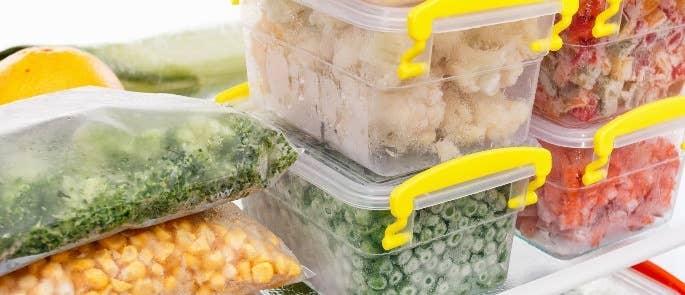Can I Freeze This & For How Long?
There are many benefits of us freezing our food; we reduce food waste, are able to prepare meals in advance, and can prolong the life of our food, to name just a few.
However, it’s important to remember that we can’t freeze every last thing in our fridges and cupboards. While freezing food is undoubtedly beneficial, it needs to be done correctly.
This guide will answer the most common questions about freezing food, from freezing meat to cake and everything in between. We’ll also explain just how long we should be leaving food in the freezer for. Those five-year-old fish fingers in the bottom of your freezer? It’s time for them to go.
Can You Freeze Meat?
Freezing meat is both very common and very easy to do. Meat generally retains its texture and taste when it’s defrosted, meaning that freezing it won’t necessarily affect its quality. However, as meat is a high-risk food, you must ensure that you freeze and defrost it safely. Use the drop-downs below to discover the safe freezing methods for meat.

Can You Freeze Cooked Chicken?
You can freeze cooked chicken. To ensure that it remains safe to eat, make sure it’s cooled down completely after cooking and then freeze it when it is. You should also wrap your chicken up before putting it in the freezer to prevent it from getting freezer burn, which can make it tough and inedible once you defrost it.
You can also freeze raw chicken, as long as it’s before its use-by date. Ensure that the chicken is suitably wrapped, such as in clingfilm or freezer bags, to prevent it from making contact with anything else in the freezer.
How long can you freeze chicken for?
You can freeze chicken for up to one year and chicken pieces, such as chicken breast or chicken wings, for up to nine months. However, the quality of the chicken will begin to deteriorate the longer it’s frozen for, so you should aim to eat it within 3 to 6 months.
Tip: Always ensure that chicken is completely defrosted before you cook it. Lots of liquid will come out of the chicken as it thaws, so make sure that you stand it in a bowl/container where it can’t touch (and contaminate) other items.
Can You Freeze Cooked Beef?
You can freeze cooked beef. Ensure that it’s cooled down completely after cooking, wrap it up to prevent it getting freezer burn, and then place it into the freezer.
The same rule applies for cooked beef mince. Make sure that your mince has cooled down after cooking it and then place it into the freezer wrapped up. If you have used the mince as part of a meal, such as in a bolognese or chilli, this can also be frozen once it has cooled, but remember to put it in an airtight container to prevent freezer burn.
You can also freeze raw beef and mince, so long as you do so before it reaches its use-by date. Wrap it up to prevent it from coming into contact with any other items in the freezer.
How long can you freeze beef for?
You can freeze beef for up to one year, however best practice states that you should consume it within 4 months to retain its optimum taste and texture. This includes roast beef as well as steaks.
For ground beef, including mince or beef-burgers, you should only freeze it for 3 to 4 months.
Tip: Once you have defrosted your meat, you must eat it within 24 hours or else it will become unsafe.
Can You Freeze Cooked Pork?
You can freeze cooked pork, so long as it has completely cooled down before you wrap it up and freeze it. This same rule applies for pork variants, such as bacon and sausages. You can also freeze these when they are raw, but you must make sure they are well packaged/wrapped and do not come into contact with other foods.
It’s generally recommended that you don’t freeze items like fresh pork pies and only freeze those that are already frozen in a supermarket. However, if you were making your own pork pies, you can freeze both the pastry and the pork centre separately, and then construct the pie once defrosted.
How long can you freeze pork for?
The length of time you can freeze pork for alters based on the pork variant. Generally, the length of time that’s safe for freezing pork is as follows:
- A pork roasting joint, pork chops, or pork steaks – this is safe for up to one year, but you should consume it within four months if you want its optimum taste and texture.
- Sausages – up to two months.
- Bacon – up to one month.
Tip: You can freeze meat for any time before its use-by date. However, if it passes the use-by date before you freeze it, you must get rid of it.
Can You Freeze Fish?
Freezing fish can sometimes be a cause of concern and worry. People are often sceptical when storing and cooking fish and shellfish, as it can have some nasty consequences if you slip up. However, as long as you follow safe cooking and freezing methods, you can enjoy it safely after defrosting. Use the drop-downs below to learn about the safe freezing methods for your favourite items of fish and shellfish.

Can You Freeze Fish?
It is completely safe to freeze fish so long as you follow some basic safe freezing rules. You must freeze it before its use-by date and ensure that it’s fully sealed, such as in a vacuum-sealed pack or tight plastic wrapping. You can freeze white and smoked fish, such as cod, haddock, and basa, oily fish such as mackerel, tuna, and salmon, and flat fish, such as sole and plaice.
It’s also safe to freeze a dish that you’ve made if it contains fish. Simply ensure that you allow the dish to cool completely before you put it into the freezer, and keep it in a sealed container to prevent freezer burn.
How long can you freeze fish for?
You can freeze oily fish for up to 4 months, white fish for up to 8 months, and flat fish for up to 10 months. You will notice a serious decline in both taste and quality after these times.
Always ensure that your fish is fully defrosted before you cook it. Never refreeze fish (or indeed any food) after it has thawed and aim to use the defrosted fish as soon as possible.
Tip: Frozen fish will come back better if you let it thaw gradually. Don’t put it in the microwave or thaw it at room temperature, as it thaws better when it remains cold and comes to temperature slowly.
Can You Freeze Shellfish?
You can freeze shellfish safely, but bear in mind that some of the taste and texture may be lost once it has thawed. This is because slow freezing can break down the meat in certain types of shellfish. If it can be frozen quickly, then this is generally better for retaining its taste and textures.
Many catering establishments are instructed not to freeze shellfish due to the breakdown of the meat’s properties and also because it is considered such a high-risk food.
How long can you freeze shellfish for?
You can freeze clams and oysters for up to 4 months and prawns, lobsters, and crabs for up to 6 months.
Tip: If you know that you are planning on freezing your shellfish, then aim to do this as quickly as possible after buying it to limit bacterial growth.
Can You Freeze Sushi?
It isn’t generally recommended that you freeze sushi, as the taste and texture of it can change dramatically during the freezing process. While the fish component of the sushi would freeze successfully, such as any salmon or prawns, the sushi rice and the nori (seaweed) would become unappetising once defrosted.
Tip: If you do have any leftover sushi, you should aim to eat it within three to four hours of making it. The components of certain sushi, such as rice and raw fish, are both very high risk, so eating sushi as soon as possible will help to prevent any dangerous consequences.
Can You Freeze Carbohydrates?
Freezing carbohydrates is relatively simple and quite common, especially if you have leftovers from meals that you want to save. It is generally quite low risk and you can save a lot of time and money doing so. Use the drop-downs below to see how each carbohydrate should be frozen.

Can You Freeze Cooked Pasta?
Freezing cooked pasta is fine, both when it’s on its own and when it’s in dishes, such as a pasta bake or a spaghetti Bolognese. Always ensure that the food is cooled to room temperature before you put it into the freezer.
If you are freezing pasta on its own, try to cook it for slightly shorter than the recommended cooking time, aiming for al dente. If you cook the pasta until it’s soft, it will develop a mushy texture once thawed.
How long can you freeze pasta for?
You can freeze pasta for about one to two months. While it is still safe beyond this, the quality will begin to deteriorate.
Tip: Toss your pasta in a slight bit of olive oil before you package it up for the freezer. This will prevent it from all sticking together in the freezer and when you defrost it.
Can You Freeze Bread?
Freezing bread is very common and is completely safe to do. You can freeze slices of bread, whole loaves, or breadcrumbs. If you decided to coat something in breadcrumbs, such as a chicken escalope, then this is also safe to freeze. Aim to freeze your bread when it’s at its freshest so that, when you defrost it, it will still hold onto its quality.
How long can you freeze bread for?
You can freeze bread for up to six months. If you freeze it for any longer, it will begin to lose its quality and change texture.
Tip: You can put bread into a toaster straight from frozen. So, if you want to avoid wasting a loaf of bread, or you don’t know when you’re going to use it, pop it in the freezer and get it out as and when you want it.
Can You Freeze Cooked Quinoa?
You can freeze cooked quinoa. For best results when freezing and defrosting your quinoa, you should let it cool completely before putting it into a sealable freezer bag. Then, let all of the air out of the bag (pressing it is the best way to do this!), pat the quinoa into an even layer, and pop it into the freezer, ensuring it’s laid flat.
How long can you freeze quinoa for?
Cooked quinoa can be stored in the freezer for eight to twelve months. After this, although it will be safe to eat, it will lose its quality.
Tip: Your defrosted quinoa will be at its best if you give it time to thaw overnight in a fridge.
Can You Freeze Rice?
Freezing and reheating rice is a topic of much debate, mostly because cooked rice is a high-risk food. Uncooked rice can contain spores of Bacillus cereus (a bacteria known to cause food poisoning) and these spores can survive when rice is cooked. Then, if rice is left to stand at room temperature, the spores can grow into bacteria. However, what happens when you freeze cooked rice? Find out using the drop-downs below.

Can You Freeze Cooked Rice?
While you can freeze cooked rice, you must only do so if you follow safe procedures.
It is best to freeze rice as soon as possible after cooking (ideally within an hour) to ensure that it doesn’t sit at room temperature for too long and bacteria doesn’t develop.
Put your rice into a microwavable container after you have cooked it and then place it in the freezer once it’s cooled. These same principles apply if you are freezing brown rice.
How long can you freeze rice for?
If you freeze rice, you should aim to eat it within one month as it will still retain its moisture and taste in this time.
Tip: When you reheat your rice, you must ensure that it’s piping hot all the way through before you eat it. Aim to eat it as soon as possible after you’ve cooked it and never reheat it more than once.
Can You Freeze Egg Fried Rice?
We’ve all been there: our eyes are bigger than our bellies when we browse the Chinese takeaway menu. We end up ordering more than we can eat and the outcome is lots of leftovers. But, can we freeze them?
The good news is that you can freeze egg fried rice, just as you can freeze normal rice. Because egg is usually scrambled into the rice, the egg yolks prevent the egg becoming rubbery once it’s defrosted. Put the rice into the freezer as soon as it’s cooled to prevent bacteria from growing on it.
How long can you freeze egg fried rice for?
Similar to freezing boiled rice, you can freeze egg fried rice for up to one month. If you leave it any longer, both the eggs and the rice will develop a mushy texture upon defrosting.
Tip: When you come to reheating your egg fried rice, try frying it back up again in the pan. This will give you a better texture than you would achieve if you were microwaving it.
Can You Freeze Dairy Products?
Dairy products, such as cheese and milk, should usually be consumed in three days once they’ve been opened. However, getting through a full block of cheddar within three days can seem near impossible for most people.
The good news is that you can freeze most of your dairy products, meaning that you don’t have to eat them all quickly or throw them away. Use the drop-downs below to learn about the different freezing methods for dairy products.

Can You Freeze Cheese?
For the dairy lovers among us, the good news is that you can freeze cheese. However, this must be done under certain conditions.
The first condition is that the type of cheese dictates whether it should be frozen or not. Hard and semi-hard cheeses can be frozen, such as cheddar, mozzarella, parmesan, gouda, and feta. Creamier and softer cheeses, however, should not be frozen as the curds and whey will separate when they’re defrosted. This includes brie, camembert, stilton, cream cheese, and low fat/lighter cheeses.
The second condition is that you should aim to break cheese down into smaller pieces before it is frozen. For best results, grate the cheese and then put it into a freezer bag. Alternatively, you can break it down into small chunks and freeze it that way if you don’t want to grate it. This will help the cheese to retain its moisture and prevent it from becoming crumbly when it’s defrosted.
How long can you freeze cheese for?
You can freeze cheese for six months. Although you can freeze it for longer, the quality will suffer once it’s defrosted.
Tip: Defrost cheese in the fridge after you have taken it out of the freezer. This will allow it to thaw gradually and will help to retain the texture as best as possible.
Can You Freeze Milk?
Milk can be frozen but, similar to cheese, you must freeze it under two conditions to enjoy it fully once it’s defrosted.
Firstly, you must freeze milk whilst it’s still within its use-by date. If you have opened the milk and had it open longer than the recommended amount of time (which is usually three days) then you shouldn’t freeze it.
Secondly, milk expands when it’s frozen. For this reason, you should never freeze milk in a glass bottle as it would crack. If you freeze it in a plastic carton, try not to freeze it when the carton is completely full. You should also leave some space around it in the freezer to allow for expansion.
How long can you freeze milk for?
Milk can be frozen for up to six months. If you freeze it for longer than this, although it will remain safe, it may start to take on some odours from other food in the freezer, which will make it taste different when thawed.
Once your milk has defrosted, you should drink it within two days.
Tip: Never use the microwave or heat to defrost milk; either thaw it in the fridge or out leave it out in a bowl of cold water on the side. If you have a layer of water on the top after thawing it, shake the carton to combine it.
Can You Freeze Butter?
Just like other types of dairy, you can freeze butter safely as long as you freeze it whilst it’s still fresh. Butter can be frozen in its original foil or tub if it’s unopened. If you’ve opened it already, place your butter into a freezer bag to freeze it, as this will help to prevent freezer burn.
To prevent the butter from taking on any odours in the freezer, try to keep it near things that have a very weak or non-existent smell.
How long can you freeze butter for?
You can freeze butter for up to four months. When it comes to defrosting it, simply put it in the fridge and allow it to thaw.
Tip: If you are following a recipe that requires melted butter, you can take your butter from the freezer and put it straight in the pan to melt.
Can You Freeze Yoghurt?
You can freeze yoghurt, but whether you should depends on what you want to use the defrosted yoghurt for and the type of yoghurt.
Firstly, the texture of yoghurt can change quite a lot when it’s thawed, often separating and becoming watery and grainy. This means that it may not be enjoyable to eat with a spoon or on top of your favourite cereal, or even in certain sauces. However, if you plan on using the yoghurt for more liquidised food, such as for smoothies or frozen desserts, the texture change won’t make too much of a difference.
Secondly, thinner yoghurts are less likely to be pleasant than thicker ones when thawed. Aside from separating and becoming watery, thinner yoghurts can develop an acidic taste once they have been frozen and thawed.
The best yoghurts to freeze are the creamy and full-fat ones, but be aware that they are unlikely to retain their creamy texture after thawing.
How long can you freeze yoghurt for?
To retain as much quality as possible, you should only freeze yoghurt for up to two months.
Tip: Once you have thawed yoghurt, you can keep it in the fridge for up to three days. However, if you thaw the yoghurt by running it under water, you should use it immediately.
Can You Freeze Vegetables?
As well as being very good for our health, vegetables are also a very good food for our freezers. Use the drop-downs below to discover how to freeze your favourite greens.

Can You Freeze Vegetables?
You can freeze most vegetables, including tomatoes on the vine, carrots, and even those trusted Christmas brussel sprouts. And, because it’s often cheaper to buy vegetables in bigger batches rather than individually, you can freeze the spares whilst saving pennies at the same time.
If you intend on freezing your vegetables, then there are a few things you should do prior to freezing to get the best results. Wash your vegetables properly, separate them, and dry them. Additionally, if you blanch the vegetables before freezing them, this will help to stop them from going mushy when thawed.
When you freeze your vegetables, ensure they are suitably wrapped/placed into freezer bags to prevent them from freezer burn.
How long can you freeze vegetables for?
So long as they are suitably wrapped and stored, you can freeze vegetables for up to one year. While they will be fine for longer, you should eat them sooner rather than later if you want them to be fresher.
Tip: Portion your vegetables out before you put them in the freezer. Then, simply get them out and add them to your favourite meals as and when you need them.
Can You Freeze Mushrooms?
Mushrooms can be frozen, which is good to know if you’re wanting to freeze your favourite varieties while they are in season. However, it’s important to ensure that the mushrooms you’re freezing are of good quality. They should be fresh and not dry, shrivelled, or have an unpleasant odour.
You should chop mushrooms into slices or dice them if you intend to freeze them, aiming to cut them into pieces that are no more than half an inch thick.
You can freeze mushrooms raw or cooked – either by blanching, sautéing, or cooking them in a meal. Freezing mushrooms raw, whilst being the quickest option, would only be good to make stews and soups with when thawed. By blanching or sautéing mushrooms, however, you will help to preserve the texture better for other purposes, such as for putting onto pizzas or into a stir fry.
If you are cooking mushrooms before freezing them, you should always ensure you allow them to cool to room temperature before placing them into the freezer.
How long can you freeze mushrooms for?
While mushrooms will remain safe in the freezer for up to 12 months, it’s best to consume them sooner rather than later to ensure they don’t go too mushy or watery. Therefore, you should aim to eat the mushrooms within six months.
Tip: Flash freeze your mushrooms to prevent them from all sticking together when frozen. To do this, spread your mushrooms out on a large tray or plate, being careful not to let them overlap. Put them into the freezer for two hours before transferring them into freezer bags or containers.
Can You Freeze Courgettes?
Freezing courgettes is perfectly fine, which is good news if you’ve grown some yourself or you’ve picked up some reduced ones at the supermarket. However, due to the high water content in courgettes, there are a few steps you should take before freezing them.
Firstly, you should slice the courgettes into pieces that are about an inch thick. Then, either blanch the courgette pieces for a couple of minutes or cook them fully. Separate the pieces out on a tray, allow them to cool to room temperature, and then flash freeze them for a couple of hours before placing them into freezer bags or containers.
How long can you freeze courgettes for?
You should freeze courgette for no longer than three months. While they will be safe if frozen for longer, the texture will be very mushy and watery once defrosted.
Tip: If you don’t have time to flash freeze the courgettes, place them into portion sizes in cling film before placing them into your freezer bag. This will help to prevent all of the courgette pieces from clumping together.
Can You Freeze Fruit?
The short answer is yes, you can freeze fruit. Fresh fruit can be expensive, so buying it when it’s reduced and then freezing it is a cost-effective thing to do.
Freezing fruit also means that you can enjoy your favourites all year round if you buy them while they are in season. Additionally, frozen fruit can have so many uses – for desserts, smoothies, or just to enjoy as a healthy snack. Use the drop-downs below to learn about the correct length of time for freezing your fruit.

Can You Freeze Berries?
Raspberries, blueberries, blackberries, and strawberries are some of the sweetest fruit around, and they’re usually at their best during the summer months.
The good news is that you can freeze berries, which means that you can enjoy them all year round. However, berries can sometimes lose their shape and some of their juices when thawed, so it’s important that they are frozen correctly.
For the best results with freezing berries:
- Rinse the berries in cold water and pat them dry with kitchen roll or paper towels. Remove the green tops from strawberries if you’re freezing them.
- Line the berries on a tray or a plate, ensuring that they aren’t touching each other. Put the tray/plate into the freezer until they are frozen solid, which may take a few hours.
- Once they’re frozen solid, transfer the berries into suitable freezer bags or containers and pop them into the freezer.
How long can you freeze berries for?
You can freeze all berries for up to six months. They will thaw quickly when you want to use them, or you can use them in certain recipes when they are still frozen, for example in smoothies.
Tip: Berries can often lose some of their juices in the freezer or when thawing. To avoid mess in case of a bag leaking, place the bag into a bowl or on a plate when thawing.
Can You Freeze Bananas?
You can freeze bananas either whole or in slices.
To freeze a banana whole, simply peel it and place it into a freezer bag or container. For slices, peel the banana and cut it into slices that are half an inch in thickness and then lay them out on a baking tray or a plate. Flash freeze the slices until they’re solid, which should take roughly two hours. Then, simply transfer them to a freezer bag or container and put them into the freezer.
How long can you freeze bananas for?
You can freeze bananas for up to six months. You can add them to a blender straight from frozen if you intend on using them for smoothies, or thaw them if you’re using them for baking, such as for banana bread.
Tip: If you want to turn your bananas into an ice cream type treat, simply peel them and insert lollypop sticks into the end before putting them into the freezer. You could even dip them into chocolate before you freeze them for a real treat.
Can You Freeze Avocados?
Freezing avocados is a topic of much debate and a bit of a yes and no answer. While some people have had success with the process, others find that avocados completely lose their taste and texture when thawed, and can even change in colour or smell.If you want to freeze avocados, you should only use them for guacamole, smoothies, or sauces once thawed. This is because the texture will differ dramatically after freezing them in your home freezer – it simply doesn’t freeze them quick enough to retain the texture. So, if you’re wanting to use the avocados for a salad or smashed onto toast, then you’re best not freezing them.
To freeze avocados, wash them, cut them in half, and then peel them. Then, you can either keep them as halves and freeze them in freezer bags or puree them. To puree avocados, mash them with a fork or put them into a food processor with either some lemon or lime juice, then put them into a freezer bag and in the freezer.
How long can you freeze avocados for?
You can keep your avocados frozen for up to six months, which is good news if you find some reduced in the supermarket and plan to use them later.
Tip: To prevent your avocados from going too mushy when thawed, allow them to gradually thaw in the fridge for up to 24 hours before you use them.
Can You Freeze Desserts?
Desserts are one of life’s simple pleasures and the good news is that, more often than not, you can freeze them and enjoy them at a different time. However, there are different rules for freezing different types of dessert, so it’s important to know them before you risk losing any of that precious sweet goodness. Use the drop-downs below to learn more.

Can You Freeze Cake?
Have you made too much cake or baked some to use at a different point in time? The good news is that you can freeze cakes relatively simply and enjoy them later.
If you are freezing a cake without any filling or icing, ensure it’s fully cooled before wrapping it tightly in cling film and then foil. This will help to prevent any air from getting into it. If you’ve made a cake with multiple layers, then wrap each cake individually to prevent them from sticking together when they thaw.
Can You Freeze Cake Batter?
If you’d prefer to enjoy a cake freshly out of the oven, or have made an abundance of cake mixture, then the good news is that you can also freeze cake batter. Cake batters made from creaming the butter and sugar together work the best for freezing, while other recipes that involve whipping egg whites separately don’t work as well.
For the best results, split the batter into sizeable portions before you freeze it, like into small servings for cupcakes, and put them into plastic containers in the freezer. Or, if you intend to make a larger cake and are freezing a bigger portion, put this into a freezer bag and then into the freezer, remembering to squeeze all of the air out of the bag.
Can You Freeze Cake with Icing?
Just when you thought it couldn’t get better for freezing cake, you can also freeze cake with icing on it. In fact, the icing acts as an insulator that helps to preserve the moisture of the cake during freezing and thawing.
To freeze a cake with icing, simply build the cake and decorate as normal. Then, put it into the freezer, being careful not to let it touch anything and damage the icing. Once the icing has become hard, roughly after a couple of hours, wrap the cake twice with clingfilm before returning it to the freezer.
How long can you freeze cake for?
Baked cakes, cake batter, and decorated cakes can be frozen for up to three months (if you can wait that long!).
Tip: If you have any excess buttercream, this freezes really well on its own. Put it in the freezer in an airtight container for up to three months and thaw it when you need it.
Can You Freeze Mince Pies?
Mince pies are a festive favourite, and sadly they’re only available to buy in shops in the winter months. However, the good news is that, if you make your own mince pies, you can freeze and enjoy them even after Christmas.
For the best results, make your mince pies and freeze them before baking. Wrap the whole tray up in cling film and simply unwrap it when you come to bake them.
How long can you freeze mince pies for?
You can keep your mince pies in the freezer for up to three months. What’s better than a mince pie in March?
Tip: If you decide not to bake your own, you can still freeze most shop-bought mince pies and enjoy them within three months.
Can You Freeze Cookies?
You can freeze cookies and enjoy them later, which means you can satisfy your sweet tooth whenever you want to!
Allow your cookies to cool completely after baking before flash freezing them on a baking tray. Once they have hardened, transfer them to a freezer bag and squeeze the air out of the bag before closing and lying flat in the freezer.
Can You Freeze Cookie Dough?
If you don’t feel like baking your cookies straight away, then you can also freeze the cookie dough.
Simply portion the dough out into balls, the same as you would if you were about to bake them. Then, place them on some baking paper on a tray and flash freeze them until they go solid. Finally, transfer them into a freezer bag, squeezing out the air, and put them into the freezer.
How long can you freeze cookies for?
You can freeze cookies for up to one month after they’ve been baked. Alternatively, your cookie dough will be good in the freezer for up to three months.
Further Reading:
- Can I Reheat This?
- How Many Times Can You Reheat Food Safely?
- How to Store Food in the Freezer
- Can I Cook This from Frozen?
- Food Safety Myths and Facts
- How Long Does Food Last in the Freezer? A Storage Guide
- Safe Temperatures for Food Storage: A Free Guide to Cooling and Chilling Times
- How to Defrost a Freezer
- Guidance on Storing Leftovers and Partly Opened Foods
- Online Food Hygiene Training











